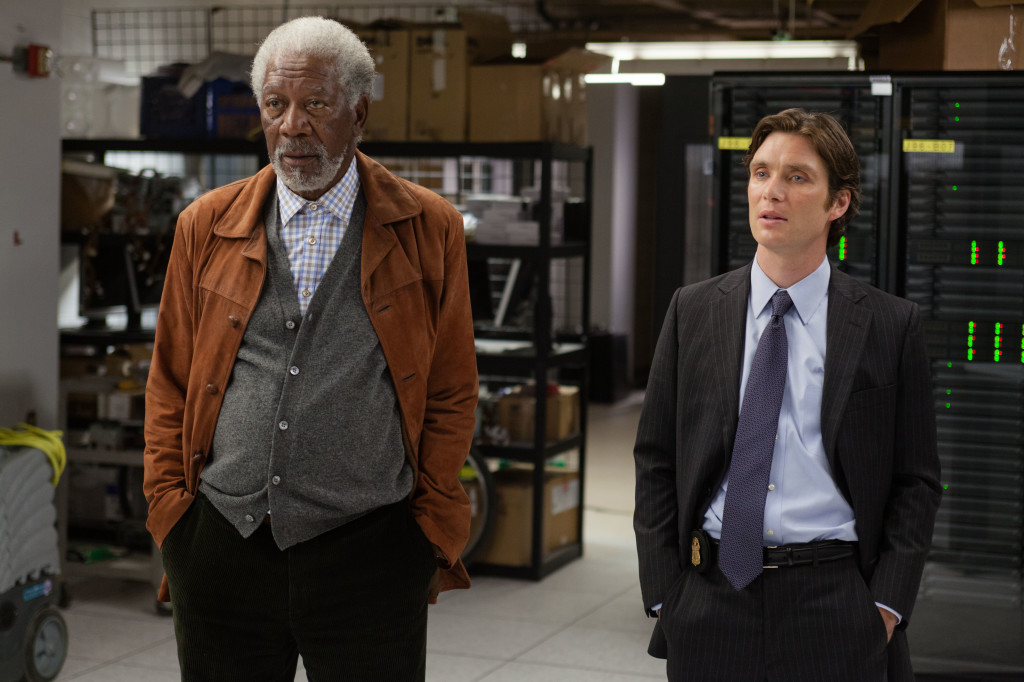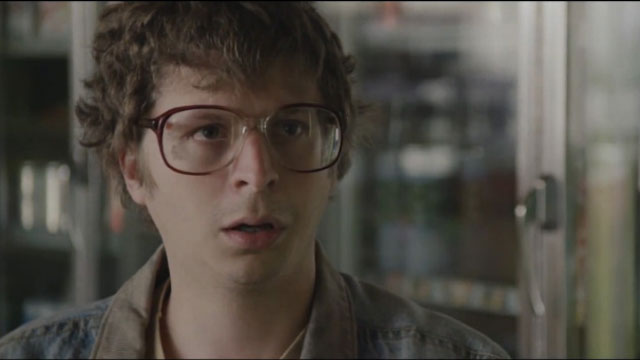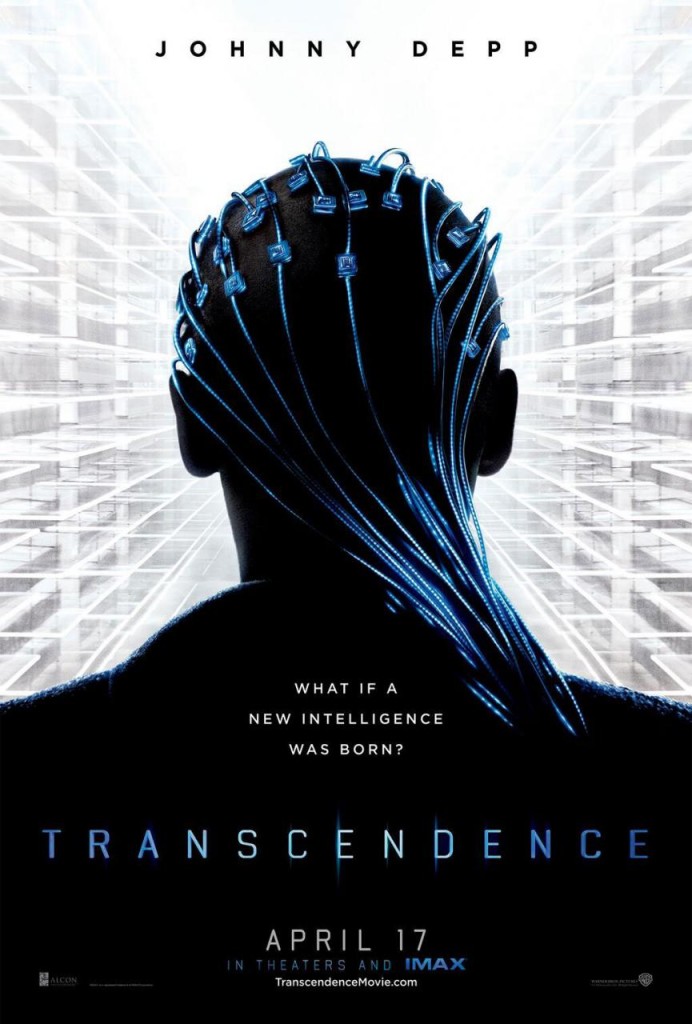The disappointing showing of Transcendence really bummed me out this weekend. Not because I had anything invested in the film. It was just one of the few non-IP properties that made it to the big screen. And for screenwriters who still believe in original ideas, it’s very important that these movies do well. Because if they don’t, we’re bound to turn into an all IP industry.
The thing is, right now, the studios would have a good case against the spec world for doing so. Nobody’s writing anything good, so why should they buy any specs or make any specs into movies?
I’ve thought about this a lot lately, and I’ve noticed some real problems in the system. One of the reasons I tell everyone to simplify their stories and make sure their GSU (goals, stakes, urgency) is strong, is because these are the only scripts that get past script readers. They’re the thrillers and the comedies that have clean easy-to-understand stories, and therefore they can pass up to their bosses without fearing the dreaded, “What the fuck is this?? Give me something I can sell!”
So what does that say to us? It says we can’t explore anything too complex. We have to stay in that little box. In many ways, specs are like the Big Mac trying to compete with the studios’ lobster. We’re not allowed to create something challenging or unique or with substance, so how the hell are we supposed to compete with projects like “The Wolf of Wall Street” or “Benjamin Button?” If neither of those projects were based on IP, they wouldn’t have sold. And that’s really hard to accept. That the playing field is so uneven.
Despite that, I don’t think writers are giving it their best. Even with that reasonable excuse, I’m not reading enough good material. And I’ve tried to figure out why. Part of me believes that screenwriting is SO much harder than everyone thinks it is. There’s so much you have to know how to do.
You have to create intriguing likable protagonists that don’t feel like every other intriguing likable protagonist we’ve seen. You have to know how to pace a script with act breaks and story beats. You have to know what conflict is so you can write entertaining scenes (I can’t tell you how often I see all 55 scenes in a script, and not a single one has conflict).
You have to know how to explore a character in a way that adds depth, and to create relationships with problems that need to be resolved. You need to know how to write dialogue that does more than simply allow two characters to speak. It must push them to speak in a way that ENTERTAINS US. You need to know how to apply suspense, obstacles, setups, payoffs, urgency, stakes. And after you figure all that stuff out, you actually have to apply it in a NATURAL way that doesn’t look like there’s any craft to it. You have to build a house that looks like it’s always been there.
And that’s hard to do.
Part of the problem is too many writers are trying for the quick fixes. They read a couple of things from this site, a couple of things from another site, and they think they’re ready to go. You can spot these scripts a mile away. There’s just no sense whatsoever that the writer’s put anything into the craft. A couple of months back I read an amateur writer’s script, and he wanted to know if his hero should secretly be the killer. I was like, “I’m not even clear what’s going on in YOUR FIRST SCENE.” Whether the killer is the bad guy or not is irrelevant. You need to figure out how to write a scene first (a scene is a story. Start with some problem your characters have to deal with, and you should come up with something reasonably good).
And that’s something I just don’t think people do anymore. Actually WORK. I came across this short last week (The Long Game) which talks about all the geniuses throughout history. Da Vinci, John Coltrane, Stephen King, people of that stature. And what the director found was that there was this period in each of these artists’ lives that he called the “Difficult Years,” where they went through this self-appointed apprenticeship. This apprenticeship would last somewhere between 7-15 years, and would consist of them practicing and experimenting and writing and reading and playing and studying, and looking for any little thing that could make them better, that would give them an edge on, or help them catch up to, their competition.
Nobody talks about those years cause they’re not decorated with No. 1 hits or groundbreaking sculptures or Pulitzer prizes. But those are the MOST IMPORTANT YEARS of the artist’s life. Coltrane spent 15 years practicing relentlessly EVERY DAY on his saxophone until he got his first real gig. And this is the best saxophonist ever! It took him 15 years of practice!
In the documentary “Jiro Dreams of Sushi,” about the best sushi chef in the world, this guy spent something like 10 years studying RICE! What region the best rice came from, the textures that worked best, how to store it, how to cook it. We’re not even talking about the fish. We’re talking about the RICE. That’s why he’s the best in the world. Because he dedicated himself to finding the perfect EVERYTHING for his food. What are you doing as a screenwriter that’s setting you apart from everyone else?
I think I know why this is such a problem for our industry. It’s because screenwriting DOESN’T LOOK THAT HARD. Why would anyone work hard at something that seems so easy? Everybody thinks they can write a screenplay. They look at what’s out in the theaters and say, “I can do better than that guy.” No, you can’t. That’s exactly WHY screenwriting is so hard, is because even the best screenwriters can’t come up with something “better than that.”
As a writer, you should be obsessively doing three things. You should be writing, you should be reading (scripts/books), and you should be studying. If you really want to have a shot at this, you have to outwork everyone else. So I challenge you. All those things I noted above (obstacles, conflict, etc.), I want you to MASTER ALL OF THEM. Work on them until your fingers bleed. That’s the only chance you have of writing something great, is if you master all the aspects of storytelling.
Now I realize that’s a tall order, so maybe I can help you focus a little. If there’s one thing I see botched over and over again – the biggest problem I see in screenplays by far – it’s boring characters. And derivative characters. Or the worst – the combos: Derivabores. So start there. Learn how to write good characters. Look back through my archives. Google the word. Re-watch all your favorite characters and take notes about why you love them.
Because the more I read, the more I realize that it’s ALL ABOUT THE CHARACTERS. If you write a bad story, you can make up for it with good characters. A great place to start is by doing the PLOT STRIP TEST. Mentally strip your plot OUT of your script and just look at your characters all by their naked selves.
Now tell me, are these characters interesting without the plot behind them? Without the explosions or the twists or the killer concept? In a script I read awhile back, I did the PLOT STRIP TEST, and here’s all that was left: A hero that was afraid of heights and a love interest who was upset that her dad died. Do those sound like interesting people to you?
Where is the flaw (she’s unable to love), the vice (she’s a sex addict), the relationship problems (these two were together once until she made a mistake and cheated on him). What’s their personality like (wise-ass)? What do they fear (sleeping alone)? What do they keep from the world (they once watched a friend rape someone and didn’t do anything about it)? I don’t want to use the dirty words “soap opera,” but you almost have to think of it that way. Are my characters interesting on their own, without the story? Because if not, you need to build a lot more into them.
But characters are still just one piece of the puzzle. Sometimes I’ll pick up a script and I don’t know what’s wrong with it. I just know that it’s lifeless, that it’s missing something.
So maybe I’ll turn to you guys for help. What do you think’s missing from today’s scripts? A lot of you called Transcendence a “bad screenplay.” What’s missing from it and other scripts like it? What is that one thing that all these writers (amateur and professional) continue to ignore?
And hey, if you think you’ve done everything I’ve said above and that you’re ready, well dog gonnit, send your script in for Amateur Friday (details at top of page). Maybe you’ll get reviewed and blow us all away. I hope so. Because baby, I want to believe again.
Oh, and finally, I’m sending out a new newsletter late tonight, and it’s going to be a good one. I’ll be reviewing a script from one of my FAVORITE writers, as well as posting some short films for you to check out. Make sure to check your SPAM boxes if you don’t receive it, and add me as a contact so it doesn’t go to SPAM in the future. If you’re new to Scriptshadow and want to sign up, go here!
Genre: Dark Comedy
Premise: When her step-brother, whom she’s never met before, gets back from rehab, a 16 year-old girl with all sorts of issues engages in a bizarre, sexually dysfunctional friendship with him.
About: Alexander McAulay has found a small level of success selling novels, but this appears to be his first real screenplay (or at least the first one he broke in with). It finished fairly high on last year’s Black List, though it is so messed up I don’t know if anyone’s going to have the balls to buy it.
Writer: Alexander McAulay
Details: 99 pages
Sometimes you read something and you go, “Did I just read that?” Because you can’t believe that you actually did. Like Fatties. I still have nightmares about the amputation fisting scene. But Flower, with its appropriately coy title, may go beyond even that script. I mean, this thing is so messed up I don’t even know where to begin.
I guess you should imagine Flower as “Fatties meets Heathers.” That would give you a small inkling of how delirious it is. The question is, would anyone actually purchase it? Getting on the Black List is great. But it doesn’t always mean a sale. It just gives you the kind of exposure that may lead to a sale.
Personally, I think this was a brilliant move by McAulay. He knew the chances of Flower getting made were slim, but he also knew that if he pushed the envelope and made the reader uncomfortable, that you’d remember his script. And call him in for a meeting. And that’s all you’re really trying to accomplish as a screenwriter. Get as many people as familiar with your work as possible. Because the more people who know you, the more rooms you get into, the more jobs you get.
Oh, so what do I mean when I say this script is crazy? Well it starts with this girl, 16 year-old Erica Vandros, blowing a really creepy old dude in a van. After he finishes, Erica’s best friends, Claudine and Kala, come out of the bushes, informing the man they’ve been taping the whole thing. If he doesn’t give them every cent he’s got, he’s going to jail for a long time. Oh yeah, and this isn’t an isolated incident. They do this ALL THE TIME.
Erica’s saving up money to bail her deadbeat dad out of jail. But her blowjob streak is interrupted when Luke moves in. Luke is her stepdad’s son, the result of a new enough relationship with her mom that she and Luke have never met. Luke is really fat. Like Southwest Airlines “buy two seats” fat. I think Erica describes him as if “Jabba The Hut sat around all day eating lard.”
So how does this relationship begin? Well, what better way to introduce yourself to your new step-brother than asking him if he wants a blowjob! Yes, Erica’s so into blowing guys (preferably guys she doesn’t know) that she actually has a sketch book where she’s drawn all the penises she’s encountered. What a classy lady. Luke is so freaked out by girls in general that he declines, and a baffled Erica eventually learns that the reason for this (and his craziness in general) has something to do with a guy who lives in the house across the street molesting him as a boy.
This angers Erica, who puts Operation Stepbrother Blowjob on hold so she can take Paul (the neighbor in question) down. She and her friends will drug him, take a bunch of sleazy pictures with him, then use those pictures to blackmail him out of everything he owns.
Things don’t go exactly according to plan though. (Spoiler) Molester Dude sort of… dies accidentally during the drugging, which means Erica’s a murderer. So she goes on the run with Luke, deciding to kill two birds with one stone and bail her father out of jail along the way. But what happens instead are a lot of confessions that amount to these two being big fat liars their whole lives. Including that little molestation accusation that led to Paul’s death. Oops.
Like I said, this is a great script to get you noticed. It’s risky. It’s daring. It makes you feel weird reading it. I wrote an article awhile back about not writing “soft” scripts. This is anything but soft. It’s got pointy, stabby edges that are continually jabbing at your insides. I mean, I’m not going to pretend like it’s God’s gift to screenwriting or anything. But I’ve been pretty bored with my reading the last few weeks and this was the first time a script really made me sit up and pay attention. So it had SOMETHING going for it.
And it wasn’t just a string of shocks either. McAulay knows how to construct a story with goals and obstacles and conflict all the way through. I liked that Erica wasn’t just sitting around on her ass being a boring independent movie character all the time. She’s out there actively making money so she can bail out her father. And when Luke enters the equation, Erica’s goal slides over to taking down the molester. That’s what you need in a script – you need to feel like the characters are moving towards something at all times, even if it’s something odd or nontraditional that would only make sense in their particular universe.
Also, if you’re going to get on the Black List like Flower, you need interesting characters – characters readers haven’t seen before. Both Luke and Erica definitely fit this bill. Luke is half-crazy, suicidal, an oxycontin addict and a food addict. And Erica’s an enigma. She’s a blowjob addict. She’s funny. She’s over-the-top. But I think, most importantly, you DON’T FORGET HER. I read so many forgettable female characters in screenplays. I PROMISE you, with this girl’s attitude and the shit that comes out of her mouth, you will NOT forget her.
The only thing that hurt the script was that every now and then, it felt “written.” In other words, when you read something, you could actually see the writer typing it down. It’s typically a bad thing as it means you’re not immersed in the story. I mean, when Erica’s mom kisses her and she yells back, “more tongue, ma! Or I feel gypped!” or when she spots Luke, “Look! Shamu’s found dry land!” or later to Luke, “Don’t you want revenge? Or did he rape all the manhood out of you?” you can smell McAulay grinning deliciously at his little insults.
And then you have things like Luke getting back from rehab, then a scene later, his molester from ten years ago moving into the house across the street – I mean, come on, what are the chances? A plot should be invisible. It must not draw attention to itself. When you cram big plot points together like that, they expose the gears of your story. The reader shouldn’t see the gears of the story. It’s like seeing behind the curtain in Oz.
The funny thing is, it almost worked. I mean, the story and characters were so out there, so weird, and people were always doing and saying things that were so bizarre, why not make it a giant translucent chicken drumstick of crazy? If you’re laughing, you might not care that you can tell the writer’s there in the room with you, typing away.
I don’t know if the masses are ready for Flower though. This thing is offensive at every turn. Who’s going to pony up five million bucks to have a high school girl parade around town offering blow jobs to old men? I guess it could happen. You have to find that really fucked up filmmaker, like a young version of whoever that guy was who directed “KIDS” back in the day. But I’m not holding my breath.
Still, despite its weirdness, I wanted to see what happened. I wanted to get to the end. And the writing was infinitely readable. Enviably sparse and to the point. It was one of the faster 99 pages I’ve ever read recently. I’m going to recommend this only to the weirdos though (like me!). If you’re not the kind of person who waits til you and your friend are alone so you can start cracking the most inappropriate, insensitive jokes in history, you’re probably not going to like this.
[ ] what the hell did I just read?
[ ] wasn’t for me
[x] worth the read
[ ] impressive
[ ] genius
What I learned: Beware the perfectly-timed coincidence. Coincidences are your enemy in screenplays. If things that you need for your story to work just show up out of nowhere at just the right time, the audience will groan and roll their eyes and call you on it. The perfect example is Luke coming back from rehab and, what do you know, the guy who molested him at some faraway camp a decade ago has just moved in directly across the street. It may be EASIER to write that plot point, since you don’t have to put any effort into it, but it’s always better to go the extra mile and make your major plot points coincidence-free.
What I learned 2: While it certainly isn’t a prerequisite, if you can write two really quirky weird characters into your script, your chances of getting on the Black List go up 100 fold. The Black List loves the unique weird offbeat strange characters.
Genre: TV Pilot – Dark Comedy
Premise: The host of a kids show that explores life’s tough questions is fired and must move cross-country and reinvent his show on a smaller budget.
About: Charlie Kaufman is coming back to TV, a place he so desperately tried to escape 20 years ago. But instead of writing bad jokes for The Dana Carvey show, this time he’s in charge of the whole shebang, and he’s bringing with him a stellar cast that includes Michael Cera, Catherine Keener, Sally Hawkins and John Hawkes. Where this will go is anyone’s guess. But the show should be debuting on FX soon, a channel that isn’t afraid to take chances on “strange” talents like Kaufman.
Writer: Charlie Kaufman
Details: 39 pages
Is it possible that something can become TOO experimental? The whole reason everyone’s rushing to TV is because they can take more chances, do more interesting things. They can actually experiment, which is something that’s become almost impossible to do in the overly processed, carefully calibrated feature market.
The question is, what do you get when you bring to TV the one person who was already able to experiment in the feature world? The guy who wasn’t having any problems creating weird narratives with strange non-conformist characters? Do you get something that is so experimental that nothing makes sense anymore? I don’t know, but I have a hankering to find out!
Like pretty much every Charlie Kaufman script I read these days, the plot for “How and Why” is a little hard to follow. The opening sequence alone takes 2-3 reads to achieve only the barest understanding of what’s happening.
We start out watching an average family sitcom, something you’d expect Tim Allen to star in. Bobby, one of the child characters in the show, is watching a show called “How and Why” on TV, which is hosted by a man named Goodman, who can best be described as a mix between Tyson Degrasse, Bill Nye The Science Guy, and Mr. Rogers. The theme of his show is asking kids profound, deeply philosophical life questions that they are clearly too young to comprehend.
Bobby turns the TV off and starts asking his parents about these questions, complete with a laugh track and un-hilarious zingers. At the end of the scene, we follow Bobby’s jovial father over to the couch, where he immediately becomes very serious. He eases into a monologue about how “none of this is funny,” and how he “used to live in a cave,” then pulls out a gun and SHOOTS HIMSELF IN THE HEAD. It’s unclear if this is the actor playing the father who does this, or the character himself, but laughs from the audience indicate it was probably part of the show.
Gotta check that pilot out.
Strangely enough, despite this overtly intense and disturbing moment, the family we just saw has nothing to do with the story. Instead we follow Goodman, that TV science guy, as he’s told by his boss that they’re going younger and that he’s fired.
Goodman moves with his family (wife and three triplet boys) to the town where his new show is picked up, (titled “Wherefore and By What Means,” since they’re not allowed to legally use “How and Why”). The production takes place at a company that used to build hallways, which are so big and elaborate that all the rooms are very small. This makes simple things like filming a show really challenging, since everybody’s so mushed together.
Back at home, Goodman starts wondering if he’s past his prime, all while dealing with a wife who doesn’t seem as interested in him as she should be, and hearing tales of his triplet sons getting bullied at school.
But everything takes a turn for the supernatural when one morning, as everyone’s getting ready for the day, they notice that all of their things have been packed back up and put into boxes. Goodman’s wife and kids are convinced it’s a ghost. But Goodman, being the practical, logic-based guy that he is, is thinking there’s gotta be a more rational explanation here.
That is until he starts hearing the faint sounds of a distant laugh track. Could this house that he’s moved into be the former house of a sitcom family? Like a REAL sitcom family? Not the actors playing in the sitcom? We’ll have to wait for future episodes to find out.
Eternal Sunshine is still one of my favorite screenplays ever. So I go into every Kaufman script hoping for a new version of that genius. But I don’t know what to make of this. It’s just so… weird. Every conventional storytelling technique is thrown out in favor of a meta storyline, somewhat gimmicky flourishes (a “hallway company”) and a hard-to-tab, hyper-realistic tone.
The unfocused oft-confusing plot doesn’t help things. We start out with the kind of sitcom where people kill themselves, only to then follow the guy in the science show that one of the sit-com characters was watching. Does that mean Goodman’s world only exists in the sitcom universe, or that his show is known in the real world as well, but was just being used as a program that one of the characters was watching? I’m not sure. And since it’s Charlie Kaufman, I’m not sure if I’m supposed to be sure.
Even if you take this unique world off the table though, and judge the pilot solely by the characters and story, it’s still hard to get into. Kaufman’s take on the world has always been dark, but it seems to be getting darker with every project, leaving a trail of sadness after every character exchange and story beat. When his wife isn’t interested in hearing about Goodman’s day, you get the sense that this man leaves a really sad existence, and finishes every day with the thought, “We’re all going to die anyway, so why even try?”
I’m a big believer that the best stories are about characters who get placed in bad situations, or who’ve hit a rough patch in life, but they don’t complain about it or give in. They fight. I think that’s why American Beauty resonated with so many people when it was a spec (and then, obviously, a film). This guy had a shitty life, but then he took action and made it better. Imagine if Lester Burnham instead said, “My life sucks. What’s the point?” then moped around for the next 90 minutes. Probably wouldn’t have been that good of a film, right?
Hey, I like hope. Kill me.
Also, I understand that Kaufman is writing what he knows here (he used to write sitcoms), but there’s something dated about this premise. I’ve seen people over-do the hyper-exaggerated sit-com thing before, as well as play the laugh track even as terrible things are happening onscreen (like people getting beat up or killed). So there was a feeling of “been there, done that” when that happened. This is Charlie Fucking Kaufman! Why not give us something new?
Why not tackle the absurdity of more current genres, like reality TV? Generally I’m not into that, but I think Kaufman could do wonders with it. What is reality? What isn’t! Who’s real? Who isn’t? That seems to be one of the themes he’s exploring anyway. But alas, I don’t think he knows or really cares about that world much.
I will say this. This script has a very specific tone to it that feels like it requires a very specific treatment. It’s kind of like if you’d read Breathless before it was made. How could you possibly envision what that movie eventually became? So I’m hoping that Kaufman has a few tricks up his sleeve when he shoots this (I think he’s directing this at least).
And How and Why does have its moments. The huge hallways and tiny rooms of his hero’s new workspace, as well as his clueless new boss, for example, make for some funny dialogue. But I’m stuck wondering if that’s going to be enough to make up for a strangely bizarre concoction that, at least from this pilot, doesn’t seem to know what it wants to be.
[ ] what the hell did I just read?
[x] wasn’t for me
[ ] worth the read
[ ] impressive
[ ] genius
What I learned: If you deal your character a bad hand, don’t have them mope about it. Or, at least, don’t have them mope about it for long. Sooner (rather than later) they should want to better their predicament. No one likes to watch anybody mope about life. It’s depressing and, typically, not what we’re looking for when we want to be entertained.
Genre: Sci-fi
Premise: A love story set in a time where a dying scientist is able to upload his consciousness into the internet and, facing its global implications, must fight against the forces who are actively working against the existence of a singularity.
About: Transcendence is one of the few spec scripts that made it to the big screen this year, and a popular one with script readers, including myself. It was Wally Pfister’s directorial debut. Pfister, Christopher Nolan’s long-time cinematographer, was blessed with a strong cast that included Johnny Depp, Rebecca Hall, Morgan Freeman, Cillian Murphy, Kate Mara and Paul Bettany. Despite what looked to be a surefire hit, the film was botched in just about every manner. Critics blasted it (it got a 20% on Rotten Tomatoes) and audiences didn’t come to see it (it made 11 million bucks over the weekend). So today, the question is, why? What happened? Where did things go wrong? I’d like to find out.
Writer: Jack Paglen
Details: 120 minutes/131 pages
Transcendence just made every single one of your jobs as writers a thousand times harder.
You may not know this, but every time a spec-script-turned-film bombs at the box office, it hurts you. Because the studios log that away and say “Yet another reason not to make spec scripts.” Which makes it harder for you, my dear writer friend, to sell a screenplay. I mean, first Draft Day bombs and now this?? We’re not exactly making a strong counter-case here.
The thing is, this should’ve worked. If ever there was a spec that felt right being turned into a movie, it was this one. It had an interesting role for a lead to play, a marketable premise, some intriguing new themes our interconnected planet is dealing with and some inventive set pieces. Black List voters jumped on board. And pretty much everyone I talked to liked the script. So then what went wrong?
For those who don’t know much about the film, here’s an abbreviated plot breakdown:
40-something Will Caster is one of a handful of scientists across the world who is making strides in artificial intelligence. His goal is to reach the “Singularity,” a nerdy term for when computers become as smart as humans. From there, it’s assumed, computers will become exponentially smarter than humans, to the point where they may want to get rid of us.
Which is exactly why a renegade group out there known as the “RIFT” is trying to assassinate Will and others like him. To “save the world.” They do end up shooting Will but not killing him. However, just when he thinks he’s in the clear, Will learns that the bullet was laced with uranium. Will will be dead in weeks from radiation poisoning.
Will’s wife Evelyn, who loves him more than anything, comes up with this wacky idea to use Will’s own research to save him, uploading his brain into a computer. With the help of Will’s reluctant best friend, Max, they’re able to pull this off just before the RIFT find them.
With the entire internet at his hands, Will becomes really powerful, and starts building a super town out in the middle of the desert. While at first Evelyn was excited to have her man back, now she’s kinda freaked out. Will monitors her 24/7, and she’s starting to feel like a kept woman. RIFT joins up with a small department in the FBI to try and take Will and his new city down, but it looks like it’s going to be too little, too late.
 “So let me get this straight Mr. Pfister. You want me to look bored the entire movie?”
“So let me get this straight Mr. Pfister. You want me to look bored the entire movie?”
The first thing I realized about the screen translation of Transcendence was that two of my favorite things about the script were gone. First, Pfister decided to nix the love-triangle between Max, Will, and Evelyn, which was a strange choice. Max’s inner struggle about whether to help Evelyn save her husband even though he secretly loved her, was one of the only aspects of the script that added any layers to the scenes. Without that, everything pretty much played out on the surface.
Then there was the compete lack of any set pieces. In the script, we get this super battle with Will’s self-made super-soldiers (which he creates via nano technology) throwing tanks and doing all these impossible things. In the movie, these “super nano humans” never engaged in any physical attacks. It was beyond bizarre. We built up to three major battle scenes, but nothing actually happened! Right as the nano-soldiers were about to unleash their awesomeness, they’d just… stop.
Now, obviously this could have been due to budgetary reasons. But I suspect it might have actually been a choice. In the script (major spoiler) we find out at the end that, despite RIFT’s insistence otherwise, Will wasn’t trying to rule the world. He was trying to help Evelyn “change the world.” In other words, Will was never bad. He was good! In order for this “shocking” twist to work, I’m guessing our director thought, “Well then Will can’t actually kill anybody! He’s a good guy.” “Aha,” he continued. “That means we can’t have those casualty-heavy set pieces anymore.”
This was a terrible choice, and a trap many writers fall into. In order to make one small aspect of their script work, they sacrifice other bigger parts of the script. In this case, we lost out on these cool set pieces for a lame twist that didn’t make all that much sense anyway.
But the truth is, I don’t think either of these were the reason Transcendence sucked. If you inserted those changes into the movie right now, it would’ve been only marginally better (maybe 35% Rotten Tomatoes instead of 20%). The reason this movie sucked was mainly due to something writers have zero control over: bad directing.
This film was botched on the directing end pretty much from the very first frame, when we get an absolutely unnecessary flash-forward (which was added to the script for God knows what reason) showing a future without internet or something. It did NOTHING for the story except make an already dangerously slow first act five minutes slower.
But here’s the real issue. Pfister has spent the majority of his career being a technician. His job is to capture an image. Directing, on the other hand, is a creative role, requiring thought and inventive choices and imagination and inspiration. Pfister never figured that out, and therefore approached directing like a technician would.
Look at Transcendence: Everything was “technically” okay here. The effects shots were fine. The cinematography was pretty good. The lighting was fine. Actors stood where they were supposed to stand and delivered their lines when they were supposed to deliver them.
But that’s not what a director is supposed to do. A director must elevate the material on the page. And Pfister was only interested in transferring the material from the page. For example, one of the most important things a director must do is get performances out of his actors. There were zero performances in Transcendence. Not a single one. Every single actor in this movie played THE EXACT SAME EMOTION. Which was downtrodden/sad/reserved. I have never seen a movie where every character acted so similarly.
Also, the dangerous thing about a character who is downtrodden/sad/reserved is that if you play that emotion wrong, it comes off as “bored.” And for that reason, every single actor in this movie looked bored. They looked unengaged. It was almost like there was a meeting beforehand to drive home the point that nobody was to emit any emotion during this movie. Ever. Just look sad and deliver your lines in a monotonous voice.
 “Hi, I’m Agent Bored.” “And I’m Agent Sad.”
“Hi, I’m Agent Bored.” “And I’m Agent Sad.”
The question was: Was this problem there in the script or just in the movie? It’s been awhile since I read the script, but I remember a more vivid and varied cast. I remember more personality in the characters. And again, I remember all the subtext that played out in that love triangle. With that gone, and everyone pretty much speaking on-the-nose, surface-level sentences to one another, it was hard to find any drama anywhere. This means you had flat performances delivering flat lines inside flat relationships. That right there is Transcendence in a nutshell.
Now, there was one big script mistake that I didn’t notice the first time around that I’m kicking myself for. And it’s a biggie. In fact, it’s one of the most destructive things you can do to your screenplay – a succubus that can destroy your script from the inside-out. Evelyn, our main character, was passive/reactive (aka the old passive protagonist problem – PPP). It’s almost impossible for a script to overcome a passive protagonist, and Transcendence shows why.
EVELYN NEVER DOES ANYTHING! She never instigates anything. She never activates anything. She never goes after anything. When your main character doesn’t do anything other than wait around for other people to make choices or do things, we will get bored with her. We will get annoyed by her. We will build up anger towards her, quietly thinking with each passing minute, “Why aren’t you DOING anything???” And that is exactly what happened here.
In fact, Evelyn is so unengaged that we begin to wonder if she really is the main character. Max, Will’s friend, is the one trying to stop all of this, but even HE’S passive in the way he goes about it, allowing RIFT to come to him and suggest they rescue her. So that’s two out of our three main characters who aren’t doing anything but waiting for others to tell them what to do.
That leaves Will. Will is active, but it’s never clear WHAT he’s actively trying to do. He’s building something… but why? We’re not sure. In the script, where we have action scenes of RIFT attacking Will, we’re distracted enough that we don’t really care that much. But now, with there being virtually no action at all, we’re a lot more aware that Will’s creation doesn’t seem to have a point.
Finally I was reminded, after reading and then watching the film, that seemingly trivial logic issues on the page become INTENSELY MAGNIFIED on the screen. When you read, your brain is more active, as it needs to construct the images of the story you’re reading. When you watch a movie, however, it’s more of a passive experience and because of that, your brain has more time to ask questions, to wonder. Indeed, I couldn’t stop wondering WHY THE HELL the U.S. Army wasn’t trying to get rid of Will’s mini-fortress??? If it was really as dangerous as they were saying, why only send a second-tier local FBI agent to fix the problem??
So what does this all mean? Well, I think the badness that is Transcendence can be blamed equally on the director and the final shooting script. Wally Pfister did not infuse a single scene with life. NOT ONE! And that’s not hyperbole. Go watch this and point out one scene that was inspired. You can’t.
But you can’t discount that script issues played a part in the problem. Like the choice to eliminate the love story, the lack of any real set pieces (which was a strength in the original script), instituting a passive main character, and allowing heavy logic issues to slip through the development phase.
If there’s anything I learned here, it’s that if it feels like a minor problem on the page, it’s going to be a HUGE PROBLEM on the screen. Get it fixed or be embarrassed once you see all those glossy eyes at the premiere.
[x] what the hell did I just watch?
[ ] wasn’t for me
[ ] worth the price of admission
[ ] impressive
[ ] genius
What I learned: Something else I learned here was the importance of CHARACTER VARIATION. Every character here emitted the same downbeat serious demeanor and it absolutely killed the movie. Without variation in character, characters can’t contrast. Without contrast, everyone feels like a clone, a walking copy of one another. Have someone get angry. Have someone be funny. Have someone be crazy. Have someone be awkward. But whatever you do, don’t have everybody be exactly alike.
This is your chance to discuss the week’s amateur scripts, offered originally in the Scriptshadow newsletter. The primary goal for this discussion is to find out which script(s) is the best candidate for a future Amateur Friday review. The secondary goal is to keep things positive in the comments with constructive criticism.
Below are the scripts up for review, along with the download links. Want to receive the scripts early? Head over to the Contact page, e-mail us, and “Opt In” to the newsletter.
Happy reading!
TITLE: I. A. A. I. (It’s All About Imagination)
GENRE: Multiple, but essentially a modern fantasy.
LOGLINE: A tiered story in which a professional screenwriter whose vices have ruined his family life and career, mentors a fledgling screenwriter with no imagination, only to find out both of their lives are controlled by a third writer who disguises himself as a cop.
WHY YOU SHOULD READ: I think you’d enjoy this screenplay because it’s a quirky story that screenwriters could certainly relate to. It’s tiered structure gives the reader/viewer something to think about as the story unfolds and is explained. There is plenty of action, some adventure, comedy, suspense, horror etc. It’s basically a story about the creative art of writing.
TITLE: LOST IN TIME
GENRE: sci-fi
LOGLINE: When a young man finds the enigmatic journal of his long missing father, he sets out to find him only to discover he may be lost not in a far away place but in a far away time – and he’s not alone.
WHY YOU SHOULD READ: I decided to send my script when I read what you wrote about having at least one MEMORABLE scene in a horror script (mine is sci-fi but with horror elements). I believe I have one because every person who read LOST IN TIME (not family or friends but people in the industry) was shocked by the last scene of the script and told me it was unforgettable. I hope you will think so too.
TITLE: The Savage South
GENRE: Driller (Drama/thriller)
LOGLINE: When a professional contract killer discovers he’s become the target of an assassination himself, he teams up with the would-be killer to figure out who set them up.
WHY YOU SHOULD READ: Been a screenwriter for a certain number of years, written some amount of screenplays, placed in various categories of various competitions, and done other unspecific things.
But why should you read this specific script? I don’t know. Because I think it’s a decent script. Because I’m genuinely curious what kind of bashing Carson gives it. Also, this was a top 10 script in the Industry Insider Competition – Roger Avary round. No, it did not win the coveted honor of first place, but Fargo also lost best picture to The English Patient, so clearly people do make mistakes.
TITLE: THE HARVESTER
GENRE: Horror
LOGLINE: Murdered to advance the construction of an exclusive golf resort, a mountain man is resurrected by Death himself and urged to seek revenge as an undead killing machine. But vengeance is just the beginning…
WHY YOU SHOULD READ: I’m a lifelong horror fanatic and very much a product of the VHS generation. While moaning about the state of modern horror movies one night, someone said “You should write a better one.” So, this is what I came up with. THE HARVESTER is a high-concept, supernatural-slasher that celebrates its bloody roots with an imaginative and fresh approach. Rest assured, there are no prolonged torture sequences, haunted houses, found footage or zombies. THE HARVESTER is something else. It’s my sincere attempt at horror the way I lovingly remember it; gruesome and gory, sure, but also eccentric, cinematic and, most importantly, FUN! THE HARVESTER is a blood-soaked blast of old-school carnage with an ending so wild and explosive; it needs to be read to be believed. Hope you’ll check it out.
TITLE: FOE
GENRE: Science Fiction
LOGLINE: In a near-future world shattered by an alien invasion, a lone Special Ops soldier, unaware that he’s the key to victory, stumbles on a group of disabled military vets holding their abandoned VA Hospital as the invaders lay siege.
WHY YOU SHOULD READ: I’ve been writing screenplays for years; had low-level agents twice; sold options twice; almost had deals 3 times; considered quitting many times, but always came back because I realized I just liked writing, and if one never sold, I’d do it anyway. So I do something over and over and expect a different result. Insanity, right? Anyway, FOE is the script I think could restore my sanity. So, for mental health–humanitarian–reasons, I’m begging you. Help a brother out.








